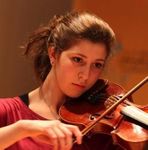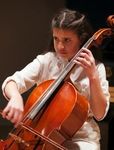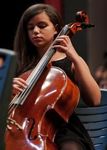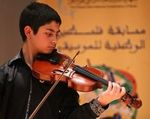Introducing the Palestine Strings Students
←
→
Page content transcription
If your browser does not render page correctly, please read the page content below
Introducing the Palestine Strings Students
Lourdina Baboun, 18, Violin 1 (Bethlehem)
Lourdina began learning the violin at the ESNCM in
Bethlehem aged nine. She says that the creativity and
challenges involved in learning a musical instrument helped
her navigate the challenges faced by young people growing
up in Bethlehem in creative and peaceful ways. “Music
brings a joy which I’m able to share with others.”
Lourdina's mother Vera was recently elected mayor of
Bethlehem. "Our family life absolutely hasn't changed, but
we all know that our mother doesn't have an easy job. We
have to support her until the end of her journey as mayor.
When she was elected, I was really happy, both for her and
for Bethlehem because I knew that she would be a
successful woman in her new job, just as she has always
been before. She will get Bethlehem what it deserves".
Lourdina wants to continue studies as a violin soloist. "In Palestine, people consider
music as a hobby, not a profession. My ambition is to help change that". Reflecting on
how music fits into Palestine's difficult socio-political situation, she says, "Music is the
best medial to cross borders. Being a musician in one of the first new generations of
musicians in Palestine, I believe we carry a message for peace, reconciliation and
growth, in a world that has experienced conflict for decades".
Sama Tarazi, 15, Violin 1 (Jerusalem)
Sama started studying violin at the age of six.
"Through studying music I've gained so many
friendships. I've learned so much, not only about
music, but also about life. Music is one of the basics
of my life now".
After taking part in Palestine’s National Music
Competition, a woman approached her saying that
her playing gave her goose-bumps. “I can't forget
this, to amaze people through performing music is
such a great experience; it's like giving away a gift".
About participating in the Palestine Strings, she says:
"I love playing music alone, but the feeling you
get when you play in a group is magnificent, it's such an adrenaline rush; you feel
energy surging through all of you together on stage ... I really can't explain it".
Sama says her goal is to play in orchestras throughout the world. She says that last
year’s performance with Nigel Kennedy made her look at classical music from a
completely different perspective, ‘a more modern one’. She's thrilled to work with him
again in London, "I feel so privileged to have this opportunity, and want to thank all the
people who are making it happen".
Costa Moustaklem, 16, Violin 1 (Ramallah)
1Costa has studied at the ESNCM in Ramallah since
2004, deciding to play the violin after seeing an
orchestra on TV. He wants to study computer
engineering or materials science at university,
continuing violin performance as his minor study. A lot
of his free time is spent playing in a string quartet with
three other students in Ramallah. ‘Whatever career I
choose, I’ll always carry on playing the violin’. ‘Maybe I’ll
teach music to young children as a part time job, or play
in am oriental music band or chamber music group’. In
the meantime he enjoys being a member of the
Palestine Youth Orchestra and hopes one day to play in
the Palestine National Orchestra.
Carol Ibrahim, 17, Violin 1 (Beit Sahour)
Carol Ibrahim wants to train as a soloist once she finishes
high school this summer. She particularly loves baroque
music, so she’s naturally very excited about performing the
Four Seasons at the BBC Proms. “I’ve seen photos online,
I was amazed, so many esteemed musicians have played
there.”
From Beit Sahour near Bethlehem, Carol recognizes the
positive impact the opening the conservatoire has had to
the community since opening six years ago, shortly after
she began learning the violin herself at age nine. “We’ve
always loved Arabic music in our village, but the
conservatoire brought more variety and choice in the music
people play and listen to and enjoy.”
Naseem Halabi, 16, Violin 1 (Beit Rima)
Naseem comes from the village of Beit Rima
near Ramallah. "When I started studying violin at
the age of seven I was only the second person
in the village ever to have studied music, and the
only one to have studied violin. Fortunately now
we have a music centre in Beit Rima and more
people have had the chance to study and enjoy
music ... it's great". Naseem, who is also an
enthusiastic composer wants to carry on his
musical studies at university when he finishes
high school, "I want to be a successful musician
and carry my nationality with me. I want to be
able to tell the world that I love music and I'm Palestinian". Last year's Palestine Strings
concert sticks out in his mind as the most exciting musical performing experience he's
taken part in to date. "It was beautiful, Nigel has so much energy when he plays and
has the ability to share it with the people playing alongside him which is an awesome
feeling".
Mostafa Saad, 15, Violin 2 (Maghar)
2Mosatafa has been playing the violin for eight years. Three
years ago he joined the Palestine Youth Orchestra as its
youngest member, which he now claims as his 'second family'.
"Playing in the Palestine Strings last year was a totally new
experience for me. It was the first time I played in an orchestra
without a conductor, and to have that experience with Nigel
Kennedy was just ... wow!" "I've seen so many concerts from
the UK on television but I've never been there. Everyone knows
it's a great place for music. It's so cool to play with Nigel and the
band again, the way they improvise is amazing”.
Mostafa is undecided about whether to study music, law, or
even violin making. Whichever path he chooses, he says that music will always take
first place in his life. At home he plays in a string quartet with his sister and brothers.
They call themselves the Galilee Quartet. Older brother Omar, 17, who also plays in
the Palestine Strings, recently made news headlines by refusing to serve in the Israeli
military. Mostafa stands by his older brother proudly: “As Palestinians, we want to play
music to help achieve peace and equal rights for our people”.
Gandhi Saad, 13, Violin 2 (Maghar)
Gandhi began studying the piano, but switched to
violin after a year when he was seven years old.
The violin came naturally to him as his older
brothers Omar and Mostafa studied viola and violin
respectively. ‘Seeing instruments around the
house making music, made me need to join in’.
Gandhi loves Arabic music, and is also a highly
gifted singer. His favorite Western orchestral
composers all hail from the Romantic era. In
addition to being thrilled at joining Nigel Kennedy
on stage at the Royal Albert Hall, he is looking
forward to escaping at the end of rehearsals to see the London Eye, Big Ben and
Buckingham Palace.
Niveen Al Atrash, 18, Violin 2 (Bethlehem)
Music was already in the family when Niveen started studying
the violin 10 years ago, both her older brothers being musicians.
Unlike her older brother who is embarking on a career as a
professional cellist, Niveen has chosen to study engineering in
the USA, starting this year, keeping up her music activities on
the side, “I’m planning to join the university orchestra and
chamber goups. Music brings people together. It’s been a great
way to make friends from all over the world”.
Mohammed Al Rjoub, 15, Violin 2 (Ein al Sultan Refugee Camp, Jericho)
3Mohammed first heard the violin in Ramallah seven
years ago and was inspired to take up the instrument
himself after his sister enrolled in an ESNCM
outreach project in Jericho. Mohammed is also a
keen horse rider and has a black belt in karate. ‘I was
inspired by the beautiful sound of the violin and the
fact it seemed to be able to play any style of music’.
He doesn’t intend to study violin at university, but
says he will keep studying and performing, and take
every opportunity to become a better violinist he can
find. ‘It was amazing to share music with Nigel
Kennedy last year, and share that music with my
friends in Palestine. I’m very excited to perform with
him again in London.’
Hanine Al Rjoub, 19, Violin 2 (Ein as-Sultan Refugee Camp, Jericho)
Hanine began learning the violin on an ESNCM
outreach program, and recently began to study viola too.
In addition to the five main ESNCM branches
(Jerusalem, Bethlehem, Ramallah, Nablus and Gaza
City), the ESNCM runs outreach programs in cities such
as Jericho. Baroque music is her favorite music both to
listen to and perform, but her happiest performing
memory was playing Tchaikovsky Piano Concerto No. 1
with Palestinian pianist Fadi Deeb and the PYO. Hanine
believes the Palestine Strings performance in the Proms
carries an important message about what Palestine is
able to achieve: “we have the ability to be in parallel with
other nations in the future, we’re still at the beginning of the road, but we have hope
that we can achieve more”. “We want to show the world that we are a people who
deserve peace”.
Marina Eichberg, 19, Viola (Beit Jala)
Marina graduated from high school with excellent
grades but took the decision to take a year out and
practice the viola with the aim of continuing her studies
in France or Germany. “Music is the only thing that’s
made me work, you have to put real effort in to reach
where you want to be. It’s a challenge to create
something that’s convincing to yourself and convincing
to others as well”. She says that her biggest inspiration
to become a musician isn’t anyone famous, but her
teacher for the past three years at the ESNCM, a
Canadian living in Beit Jala, where Marina is also from.
Beit Jala is a hilltop village next to Bethlehem, “Most of
the time it’s a quiet, serene and a pretty place to live”.
“The important thing for me about playing at the BBC
Proms is that we have the chance to show that Palestine has something cultural to
offer. Like every other nation out there, we’ve got what it takes to create music and art.
It’s our way of fighting and proving a point”.
Omar Saad, 17, Viola (Maghar)
4Omar Saad’s younger brother’s violin teacher
encouraged him to take up the viola six years ago. He
says his teacher Leonid Kuperman, contributed invaluably
to his musical knowledge and style of playing. Omar
intends to study towards a professional career as a violist,
but has been working as a tennis coach, and competes
actively as a swimmer. He recently wrote to the Israeli
Ministry of Defence, refusing to partake in military service.
As a Palestinian Druze male, he is obliged to serve in the
Israeli army when he reaches 18. The letter, which says
that he refuses to violently oppress people he grew up playing music with, has been
translated into numerous languages and inspired a Facebook page which attracted
over 10,000 members in only a matter of days, “I was surprised and didn’t think it would
echo so fast amongst people who understand my point of view.” Despite still being
under 18, Omar faces jail for his non-violent insistence that all people are equal,
regardless of their ethnic or religious background. “I’m not scared by prison, but I do
think about it all the time. After all, it’s not a normal place to be.”
Tala Khoury, 23, Viola (Ramallah)
Tala Khoury, has played the viola since she was 6,
studying at the ESNCM shortly after it was founded.
She recently graduated as a nutritionist and began
working for the World Health Organization. Tala keeps
up her viola playing by performing at in the ESNCM
Orchestra and the Palestine Youth Orchestra as well
as various Arabic music groups in Ramallah where her
family live. Her favorite performing memory relates to
a recent PYO performance at the National
Conservatory in Rome. Several members of the
Palestinian Diaspora were there, many of them
refugees or people unable to return to Palestine.
Some of the audience had asked if the orchestra could
play the nationalist song ‘Mawtini’ during the interval. At the end of the concert, the
leader stood up and began playing it from memory, eventually all the musicians joined
in, receiving a standing ovation from the audience.
Jude Mohammed Amous, 13, Cello (Jerusalem)
Jude Amous has been playing the cello since she was six
years old, and sites her biggest musical influence as the
American cellist Yo Yo Ma. Her favorite piece of music is
currently the Overture to Mozart’s Marriage of Figaro, which
she discovered recently when she had to learn its famous
opening for a recent Palestine Youth Orchestra audition.
Jude also plays basketball and enjoys acting. She has never
seen a professional symphony orchestra live. Her first
experience will be seeing the BBC Symphony Orchestra
perform Holst’s The Planets at the BBC Proms this summer
whilst the Palestine Strings are in London rehearsing at
Maida Vale Studios.
Rand Khoury, 12, Cello (Jerusalem)
5Rand Khoury has been playing the cello for seven years,
studying at the ESNCM in Jerusalem. Rand used to lead
the cello section in the Jerusalem Children’s Orchestra,
and was this year accepted into the Palestine Youth
Orchestra for the first time, where she will be the youngest
student this year. She enjoys the annual ESNCM summer
camps, which include orchestral and chamber music
workshops, and also enjoys horse riding and playing
soccer.
Iman Abbasi, 16, Cello, (Jerusalem)
Iman Abbasi was awarded a scholarship to study at cello
at the ESNCM six years ago. Together with her brother
and her sister, she represents the first generation of
musicians in her family. ‘I love the cello and enjoy playing
it’. Besides playing the cello, Iman performs in a traditional
folkloric dance troupe, a dabke group, and also competes
learns Taekwondo, and has competed in several
Taekwondo tournaments recently in Palestine.
Eleni Moustaklem, 19, Double Bass, (Ramallah)
Eleni Moustaklem began playing the double bass six
years ago after her piano teacher, also a bass player,
recommended she try the instrument. She has no
regrets, and her bass playing keeps her busy every
moment outside of her English literature and
translation studies at Birzeit University. Aside from
classical groups, she plays in Arabic music ensembles
and a host of fusion groups in her hometown. ‘When
we were on stage with Nigel Kennedy it felt more fun
to play music, and we felt like the audience were more
interested. He certainly knows how to reach the
audience and maintain their attention. He has a
beautiful aura and enjoys his playing.’ Asked about
Palestine’s best asset, Eleni says, ‘We have a strong
bonding to this land, to its history, and to a stolen identity that we are not ready to
surrender. The will to exist and carry on is our strongest trait. Our strongest asset is
our love for Palestine’.
6You can also read



























































